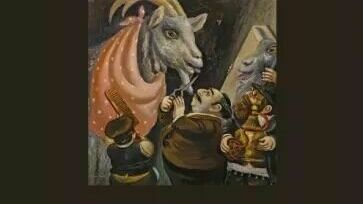Posted 8 февраля 2023, 09:42
Published 8 февраля 2023, 09:42
Modified 8 февраля 2023, 11:58
Updated 8 февраля 2023, 11:58

Humans versus demons. A new book by Yakov Shechter has been published
Anna Berseneva
In his new book "He's Already Coming" (Rostov-on-Don: Phoenix. 2023), Yakov Shechter created a rare environment in which people and demons feel completely at home.


For their joint habitation (and it happens more than a hundred years ago), the author came up with the Galician town of Kuruv. Jews, who make up the majority of the Kuruvian population, habitually coexist with demons in it. Life flows idyllically here: "Stoves were heated in the houses, and smoke, infused with the smell of burnt pine resin, hovered over the Kuruv. It was easy and free to breathe, life, a happy, long life, filled to the brim with either joyful or sad events, stood in front of a Cold arch of black poplar branches, illuminated by cold white snow". And it's not only and not even so much in the beautiful landscapes framing the Kuruva life, as in its content:
"The life of poor workers, filled with sincere, pure service to the Creator who created such conditions for them, flowed smoothly, leaving no trace in this world. Perhaps, in the heights of the mountains, every snore in class, every psalm capital, read from memory amid the running and confusion, was recorded with a diamond pen on golden tablets. But in the world below, the gray canvas of their everyday life was decorated with rare colored sparks, and they themselves passed through life unnoticed, one by one disappearing without a trace under the tombstones".
However, the inhabitants of the Dolny Kuruvsky world, for all their external ordinariness, appear in the book of Yakov Shechter so expressive that the canvas of their everyday life does not look gray at all.
This is a young Zyama who does not know what will come out of him in life, but dreams of "writing a deep, very deep book, or learning how to deliver inspired sermons, or reaching the very peaks in the understanding of the Talmud, where only great teachers of the law reached".
These are simple Jewish women who do not even need to be taught the Torah, because "holiness fills their souls while cooking, and the Almighty himself controls their fingers".
These are the newlyweds Aizik and Shayna, who "diligently avoided sharp corners and explosive situations", and therefore "Shayna cooked the fish herself and at first spoiled it to the point of impossibility. But Ayzik ate and praised, and gradually the fish began to come out quite edible, and then even tasty".
In general, the marks of wisdom, dolny and everyday interspersed with the mountain and difficult to comprehend, are scattered throughout all the stories that make up the book "He is already coming." Moreover, the carriers of this sparking wisdom are literally all the characters, even those who can't stand all kinds of distractions. So, Kopl from the story "The Right Choice" notes that while he was spending time in the yeshiva studying these very abstractions, "life around him was crumbling like scrambled eggs on a hot frying pan, and instead of slurping it with a full spoon, he was collecting dry crumbs." As a result of such reflections, Kopl decided that he no longer wanted to be a Jew, and converted to Catholicism. And then a demon appeared in his life…
And Shayna, Aizik's wife, did not think of anything like that, but the demon still appeared in her life because he fell in love with her ("Demon Love").
And the hunchback Zalman-Shneur "fought against the world like a bird that flew into a room by mistake, beats against walls, window glass, ceiling, trying to escape from captivity," and therefore he wanted to become a demon himself ("A man who wanted to become a demon"). The forbidden knowledge opened to him like a bonbonniere with sweets, and he began to see "mazikin, pests, about which it is written in the Talmud that they surround a person like a watering groove surrounds a tree," but the demons did not pay attention to him, passing by as if by an empty place.
And this Jewish world is so colorful, its inhabitants and the details of their everyday existence are so vivid that the appearance of demons and demons next to them does not look out of the ordinary. Probably, the fact is that there is really no commonplace in their existence, because "holiness hides in everyone's heart, just like the crimson seeds of a pomegranate hide behind a dark peel." So do not be surprised at the dizziness of the events that occur with the inhabitants of Kuruva, and the fantasticism of the creatures that are involved in these events.
But what is surprising is the absolute serenity in which the reader is immersed in a world where demons and demons feel at home. However, this is one of the main signs of the narrative manner of Yakov Shechter in general and his new book in particular. Her name is vitality. The love of life of the heroes does not allow demons to prevail over good and reason, which form the basis of life. The author, apparently, does not doubt this, because his book about evil spirits turned out to be so life-affirming.